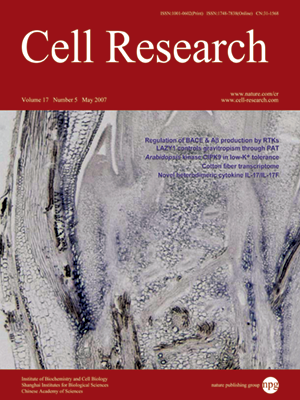
Volume 17, No 5, May 2007
ISSN: 1001-0602
EISSN: 1748-7838 2018
impact factor 17.848*
(Clarivate Analytics, 2019)
Volume 17 Issue 5, May 2007: 389-401
ORIGINAL ARTICLES
Receptor tyrosine kinases positively regulate BACE activity and Amyloid-β production through enhancing BACE internalization
Lin Zou1,2,*, Zhu Wang1,*, Li Shen1,3, Guo Bin Bao1, Tian Wang1, Jiu Hong Kang1 and Gang Pei1
1Laboratory of Molecular Cell Biology, Institute of Biochemistry and Cell Biology, Shanghai Institutes for Biological Sciences, Chinese Academy of Sciences, Shanghai 200031, China;
2Clinical Molecular Medical Center, Children's Hospital, Chongqing University of Medical Sicences, Chongqing 400011, China;
3Graduate School of the Chinese Academy of Sciences, Shanghai 200031, China
Correspondence: Gang Pei(gpei@sibs.ac.cn)
Amyloid-β (Aβ) peptide, the primary constituent of senile plaques in Alzheimer's disease (AD), is generated by β-secretase- and γ-secretase-mediated sequential proteolysis of the amyloid precursor protein (APP). The aspartic protease, β-site APP cleavage enzyme (BACE), has been identified as the main β-secretase in brain but the regulation of its activity is largely unclear. Here, we demonstrate that both BACE activity and subsequent Aβ production are enhanced after stimulation of receptor tyrosine kinases (RTKs), such as the receptors for epidermal growth factor (EGF) and nerve growth factor (NGF), in cultured cells as well as in mouse hippocampus. Furthermore, stimulation of RTKs also induces BACE internalization into endosomes and Golgi apparatus. This enhancement of BACE activity and Aβ production upon RTK activation could be specifically inhibited by Src family kinase inhibitors and by depletion of endogenous c-Src with RNAi, and could be mimicked by over-expressed
c-Src. Moreover, blockage of BACE internalization by a dominant negative form of Rab5 also abolished the enhancement of BACE activity and Aβ production, indicating the requirement of BACE internalization for the enhanced activity. Taken together, our study presents evidence that BACE activity and Aβ production are under the regulation of RTKs and this is achieved via RTK-stimulated BACE internalization, and suggests that an aberration of such regulation might contribute to pathogenic Aβ production.
Cell Research (2007) 17:389-401. doi: 10.1038/cr.2007.5; published online 27 February 2007
FULL TEXT | PDF
Browse 1874


